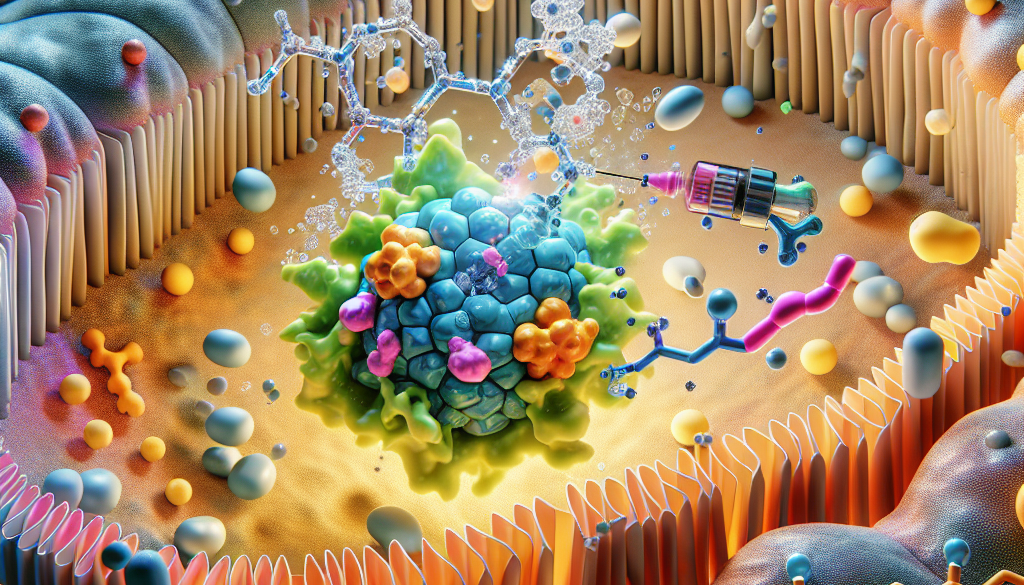Squalene Epoxidase Inhibitor: Explained
-
Table of Contents
- Squalene Epoxidase Inhibitors: A Comprehensive Guide
- Understanding Squalene Epoxidase
- The Mechanism of Squalene Epoxidase Inhibition
- Therapeutic Applications of Squalene Epoxidase Inhibitors
- Examples and Case Studies
- Statistical Insights
- Challenges and Considerations
- Conclusion
- Discover ETprotein’s High-Quality Protein Products
Squalene Epoxidase Inhibitors: A Comprehensive Guide

Squalene epoxidase inhibitors represent a significant advancement in the field of biochemistry and medicine. These inhibitors target a crucial enzyme in the sterol biosynthesis pathway, offering potential therapeutic benefits for various diseases. This article delves into the science behind squalene epoxidase inhibitors, their applications, and the impact they have on health and disease management.
Understanding Squalene Epoxidase
Squalene epoxidase is an enzyme that plays a pivotal role in the biosynthesis of sterols, including cholesterol. It catalyzes the first oxygenation step in the conversion of squalene to lanosterol, which is a key precursor to cholesterol and other sterols. Given the importance of cholesterol in cell membrane integrity and as a precursor to steroid hormones, inhibition of squalene epoxidase can have profound effects on cellular function and overall health.
The Mechanism of Squalene Epoxidase Inhibition
Inhibitors of squalene epoxidase work by binding to the enzyme and preventing it from interacting with its substrate, squalene. This blockade halts the production of lanosterol and, consequently, cholesterol. The reduction in cholesterol synthesis can be beneficial in conditions where cholesterol levels are pathologically high, such as in hypercholesterolemia.
Therapeutic Applications of Squalene Epoxidase Inhibitors
Squalene epoxidase inhibitors have been studied for their potential in treating various conditions:
- Hypercholesterolemia: By reducing cholesterol synthesis, these inhibitors can help manage high cholesterol levels, thereby reducing the risk of cardiovascular diseases.
- Antifungal Therapy: Fungi also utilize squalene epoxidase in their sterol biosynthesis. Inhibitors can therefore act as antifungal agents, useful in treating fungal infections.
- Cancer Research: Some cancers exhibit altered cholesterol metabolism. Squalene epoxidase inhibitors might disrupt the growth and proliferation of cancer cells by affecting their sterol biosynthesis.
Examples and Case Studies
One of the most well-known squalene epoxidase inhibitors is terbinafine, primarily used as an antifungal medication. Terbinafine’s effectiveness against fungal infections like athlete’s foot, ringworm, and nail fungus has been well-documented in numerous clinical trials.
In the context of cancer, studies have shown that certain squalene epoxidase inhibitors can induce apoptosis in cancer cells, suggesting a potential role in cancer therapy. However, these findings are still in the early stages, and more research is needed to fully understand their therapeutic potential.
Statistical Insights
Statistics show that cardiovascular diseases are the leading cause of death globally, accounting for an estimated 17.9 million lives each year. High cholesterol is a major risk factor for these diseases. The development of effective squalene epoxidase inhibitors could play a crucial role in reducing this burden.
Moreover, the global antifungal drugs market size was valued at USD 12.1 billion in 2020 and is expected to expand at a compound annual growth rate (CAGR) of 1.5% from 2021 to 2028. This growth underscores the importance of antifungal agents, including squalene epoxidase inhibitors, in treating fungal infections.
Challenges and Considerations
While squalene epoxidase inhibitors offer promising benefits, there are challenges and considerations in their use:
- Side Effects: Inhibiting cholesterol synthesis can lead to side effects, as cholesterol is vital for many bodily functions.
- Resistance: Fungal resistance to antifungal agents, including squalene epoxidase inhibitors, is an emerging concern that requires ongoing research.
- Selectivity: Developing inhibitors that selectively target squalene epoxidase without affecting other enzymes in the sterol biosynthesis pathway is crucial for minimizing side effects.
Conclusion
Squalene epoxidase inhibitors represent a versatile class of compounds with potential applications in treating hypercholesterolemia, fungal infections, and possibly cancer. While they offer promising therapeutic benefits, careful consideration of their side effects and the potential for resistance is necessary. Ongoing research and development are essential to fully harness the potential of these inhibitors in clinical settings.
Discover ETprotein’s High-Quality Protein Products
For those interested in the broader health and wellness industry, ETprotein offers a range of high-quality protein products that can complement various health regimens. Their offerings include organic and clear protein powders derived from rice, pea, watermelon seed, pumpkin seed, sunflower seed, mung bean, and peanut. These products are non-GMO, allergen-free, and characterized by a neutral taste, making them an excellent choice for consumers and manufacturers alike.
About ETprotein:
ETprotein, a reputable protein and L-(+)-Ergothioneine (EGT) Chinese factory manufacturer and supplier, is renowned for producing, stocking, exporting, and delivering the highest quality organic bulk vegan proteins and L-(+)-Ergothioneine. They include Organic rice protein, clear rice protein, pea protein, clear pea protein, watermelon seed protein, pumpkin seed protein, sunflower seed protein, mung bean protein, peanut protein, and L-(+)-Ergothioneine EGT Pharmaceutical grade, L-(+)-Ergothioneine EGT food grade, L-(+)-Ergothioneine EGT cosmetic grade, L-(+)-Ergothioneine EGT reference grade and L-(+)-Ergothioneine EGT standard. Their offerings, characterized by a neutral taste, non-GMO, allergen-free attributes, with L-(+)-Ergothioneine purity over 98%, 99%, cater to a diverse range of industries. They serve nutraceutical, pharmaceutical, cosmeceutical, veterinary, as well as food and beverage finished product distributors, traders, and manufacturers across Europe, USA, Canada, Australia, Thailand, Japan, Korea, Brazil, and Chile, among others.
ETprotein specialization includes exporting and delivering tailor-made protein powder and finished nutritional supplements. Their extensive product range covers sectors like Food and Beverage, Sports Nutrition, Weight Management, Dietary Supplements, Health and Wellness Products, and Infant Formula, ensuring comprehensive solutions to meet all your protein needs.
As a trusted company by leading global food and beverage brands and Fortune 500 companies, ETprotein reinforces China’s reputation in the global arena. For more information or to sample their products, please contact them and email sales(at)ETprotein.com today.














